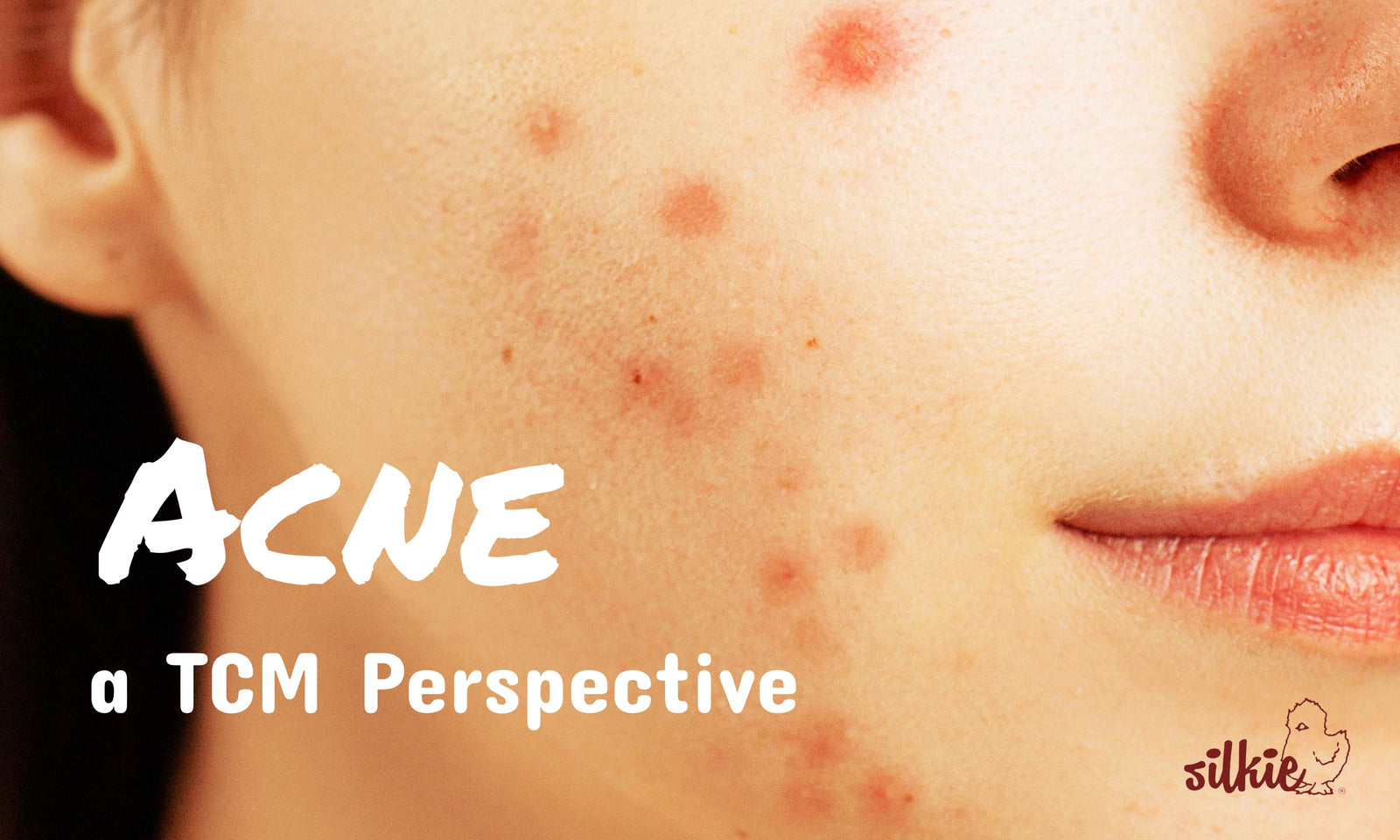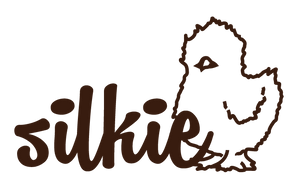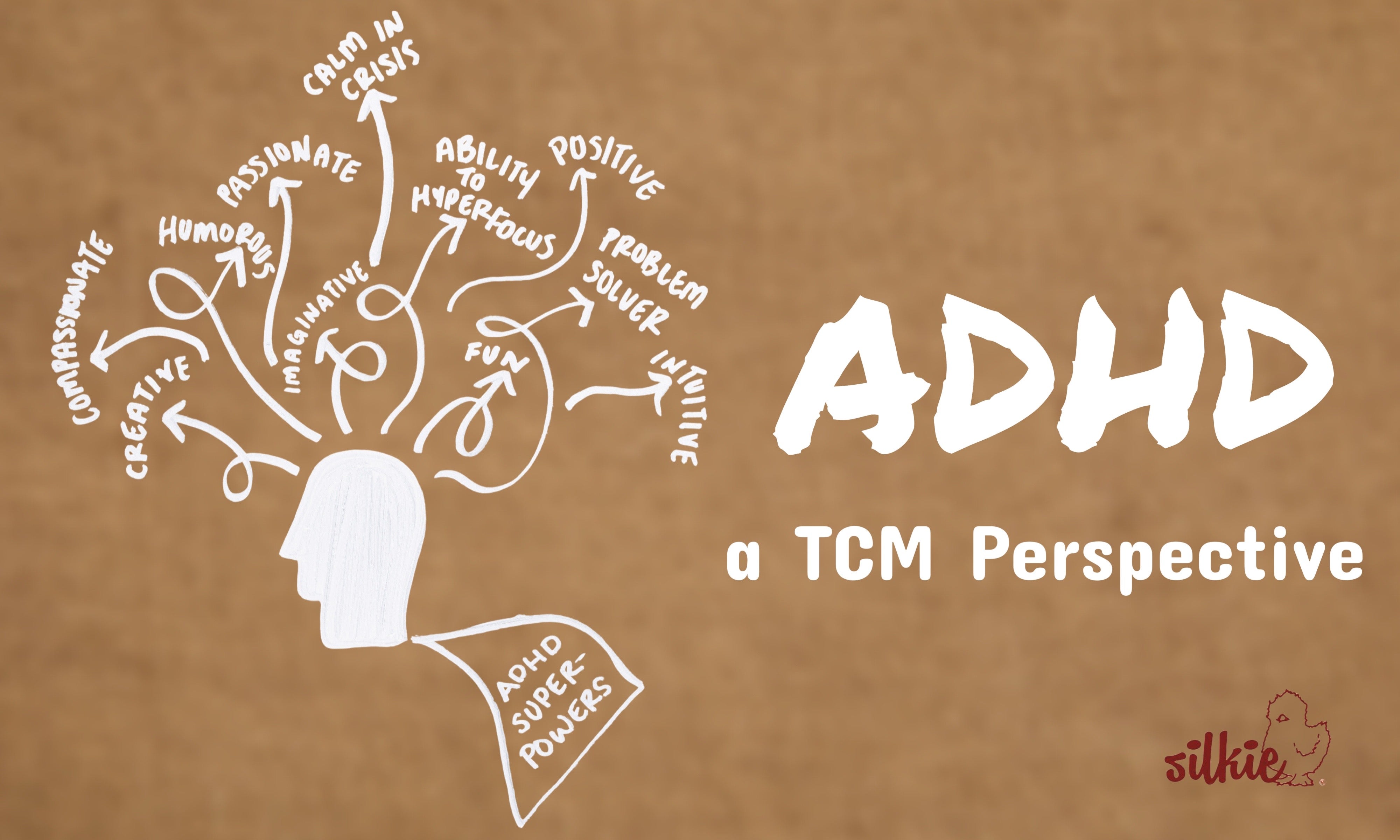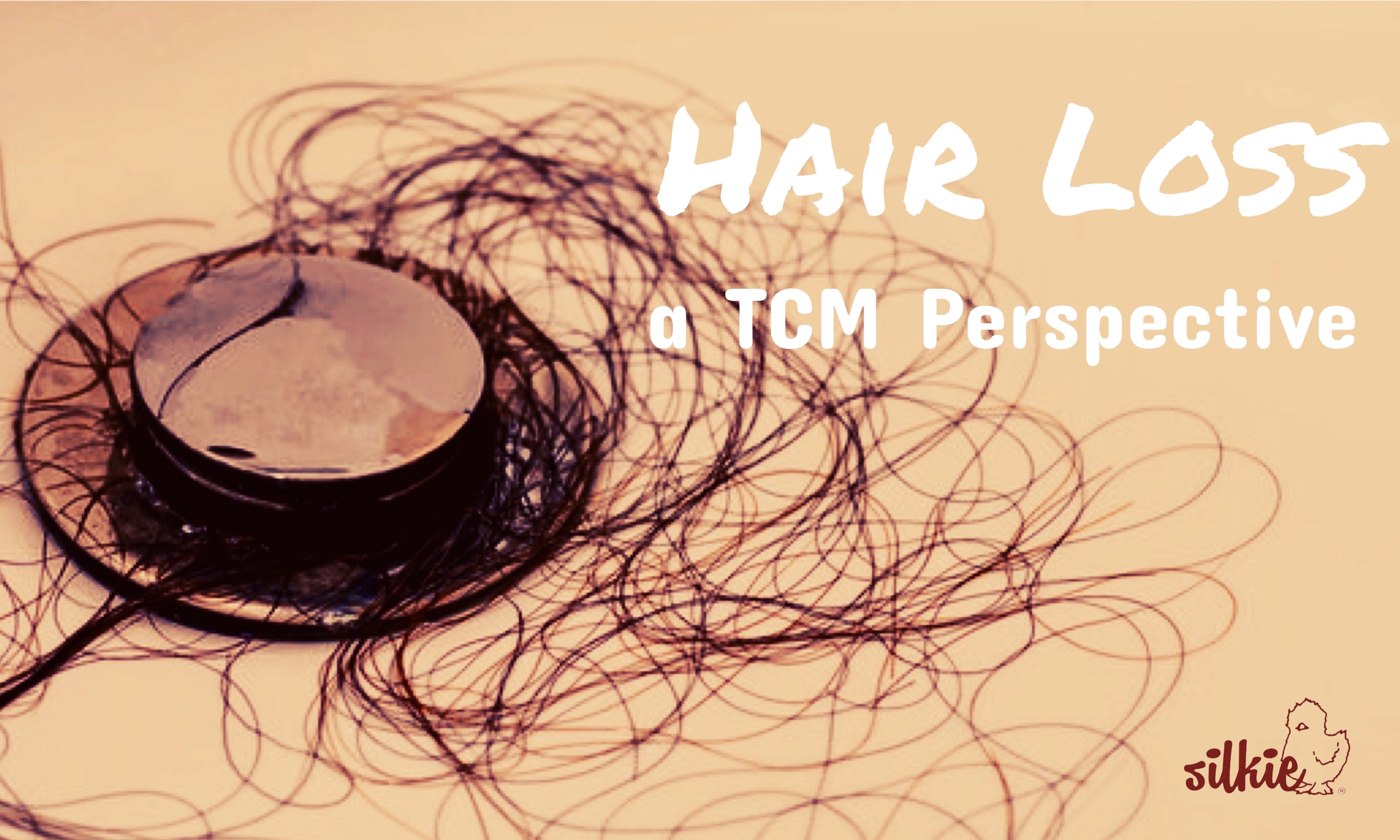6 Types of Acne and What They Tell You About Your Skin: From Traditional Chinese Medicine to Western Approaches

By Ann Tam
Acne, zits, or pimples are a common skin condition that affects people of all ages, although it is most prevalent during adolescence. It occurs when hair follicles become clogged with oil and dead skin cells, leading to the formation of various types of lesions on the skin. While it is not a life-threatening condition, acne can have significant physical and psychological effects, impacting self-esteem and quality of life.
Types of Acne
Acne, zits, or pimples can manifest in various forms, including:
Blackheads: Open comedones that appear as small, dark bumps on the skin's surface. They are caused by clogged pores containing a mixture of oil and dead skin cells.
Whiteheads: Closed comedones that appear as small, flesh-colored bumps on the skin. Like blackheads, they are also caused by clogged pores but remain closed at the surface.
Papules: Small, red bumps that are tender to the touch. Papules occur when the walls surrounding the pores become inflamed and break down.
Pustules: Similar to papules, pustules are red, tender bumps with a white or yellow center filled with pus.
Nodules: Large, painful, solid lumps beneath the surface of the skin. Nodules form deep within the hair follicles and can be difficult to treat.
Cysts: Deep, pus-filled lumps that are painful to the touch and can cause scarring. Cysts are the most severe form of acne and often require medical intervention.
Western Medicine Perspective on Acne:
Acne, from the viewpoint of Western medicine, is a multifactorial skin condition that involves a combination of genetic, hormonal, and environmental factors. Understanding the pathophysiology of acne is crucial for effective treatment and management. Here's a detailed overview of acne from the Western medicine perspective:
Causes:
Excess Sebum Production: One of the primary contributors to acne is the overproduction of sebum, an oily substance produced by the sebaceous glands in the skin. Sebum helps keep the skin lubricated, but excess production can lead to clogged pores and acne formation.
Clogged Hair Follicles: When dead skin cells and excess sebum accumulate in hair follicles, they can form a plug, creating an ideal environment for the proliferation of bacteria, particularly Propionibacterium acnes (P. acnes).
Bacterial Infection: P. acnes, a type of bacteria commonly found on the skin, plays a significant role in the development of acne. The bacteria multiply within clogged pores, triggering inflammation and the formation of acne lesions.
Inflammation: The body's immune response to bacterial colonization and clogged pores leads to inflammation in the affected area. This inflammatory response contributes to the redness, swelling, and pain associated with acne lesions.
Hormonal Factors: Hormonal fluctuations, particularly during puberty, menstruation, pregnancy, and menopause, can influence sebum production and contribute to acne development. Androgens, the male hormones present in both males and females, play a crucial role in stimulating the sebaceous glands.
Genetic Predisposition: Genetics also play a role in acne development. Individuals with a family history of acne are more likely to experience the condition themselves, suggesting a genetic predisposition to acne susceptibility.
Treatment Approaches:
Treatment for acne aims to reduce sebum production, unclog pores, kill bacteria, and decrease inflammation. Common treatment options in Western medicine include:
Topical Treatments: Over-the-counter and prescription topical medications containing ingredients such as benzoyl peroxide, salicylic acid, retinoids, and antibiotics can help unclog pores and reduce inflammation.
Oral Medications: Oral antibiotics, hormonal therapies (such as birth control pills for women), and isotretinoin (Accutane) may be prescribed for moderate to severe acne cases.
Lifestyle Modifications: Adopting a skincare routine that includes gentle cleansing and moisturizing can help manage acne. Avoiding harsh skincare products, touching the face, and picking at acne lesions can also prevent further irritation and scarring.
Procedures: Dermatological procedures such as chemical peels, microdermabrasion, laser therapy, and corticosteroid injections can be effective in treating stubborn or severe acne and reducing the risk of scarring.
Traditional Chinese Medicine (TCM) Perspective on Acne:
Acne, known as "Fěncì" or "Àn Chuāng" in Traditional Chinese Medicine (TCM), is understood as a manifestation of internal imbalances within the body. TCM views acne not merely as a superficial skin condition but as a reflection of disharmonies in the body's organ systems and the flow of qi, or vital energy. Here's a detailed overview of acne from the TCM perspective:
Causes:
Internal Heat and Dampness: TCM attributes the development of acne to an accumulation of internal heat and dampness in the body. Heat refers to excessive metabolic activity and inflammation, while dampness refers to stagnation and accumulation of fluids. Together, heat and dampness create an environment conducive to the formation of acne lesions.
Liver Qi Stagnation: In TCM, the liver is responsible for the smooth flow of qi throughout the body. Emotional stress, frustration, and anger can lead to liver qi stagnation, which may manifest as acne, papules, or pustules, particularly along the jawline and cheeks.
Spleen and Stomach Imbalances: The spleen and stomach play crucial roles in digestion and the transformation of food into qi and blood. Weakness or dysfunction of these organs can lead to dampness accumulation, affecting the skin's health and contributing to the development of acne or comedones that can be either open (blackheads) or closed (whiteheads).
Blood Stasis: Stagnation of blood circulation, known as blood stasis, can result from various factors such as trauma, poor circulation, or menstrual irregularities. Blood stasis may exacerbate inflammation and delay the healing process of acne lesions.
Qi and Blood Circulation: TCM emphasizes the importance of proper qi and blood circulation for overall health, including skin health. Acne is often seen as a result of stagnant qi and blood, which can lead to the formation of cysts, nodules, and painful lesions.
External Influences: In addition to internal imbalances, TCM considers external factors that may contribute to acne. These factors include exposure to damp or hot environments, excessive consumption of spicy or greasy foods, and emotional stress.
Patterns of Disharmony:
TCM categorizes acne into different patterns of disharmony based on the presenting symptoms and underlying imbalances. Common patterns associated with acne include:
Heat in the Lung and Stomach: This pattern is characterized by red, inflamed acne lesions, often accompanied by excessive oiliness and heat sensations in the affected areas.
Liver Qi Stagnation: Acne associated with liver qi stagnation typically presents as papules and pustules along the jawline and cheeks. Emotional stress and menstrual irregularities may exacerbate this pattern.
Spleen Qi Deficiency with Dampness: Individuals with this pattern often experience acne accompanied by fatigue, bloating, and poor digestion. The skin may appear dull, and acne lesions may be slow to heal.
Blood Stasis: Acne with blood stasis manifests as dark, stubborn lesions that take longer to resolve. Patients may also experience menstrual irregularities and pain.
TCM Treatment Approaches:
TCM treatment for acne focuses on addressing the underlying patterns of disharmony and restoring balance to the body. Treatment modalities may include:
Herbal Medicine: TCM herbal formulas are prescribed based on the individual's pattern of disharmony. Chinese herbs for acne, zits, or pimples are commonly used herbs with heat-clearing, dampness-drying, and blood-invigorating properties that are commonly used to treat acne.
Acupuncture: Acupuncture helps regulate the flow of qi and blood, reduce inflammation, and balance the organ systems implicated in acne. Acupuncture points on the face and body may be selected based on the individual's pattern of disharmony.
Dietary and Lifestyle Modifications: TCM emphasizes the importance of dietary and lifestyle factors in managing acne. Recommendations include avoiding greasy, spicy foods, reducing stress through relaxation techniques such as Tai Chi or QiGong, and ensuring adequate rest and sleep.
Topical Applications: Herbal poultices or compresses containing herbs with anti-inflammatory and antimicrobial properties may be applied topically to reduce inflammation and promote healing of acne lesions.
Nano Needling with Herbal Serums: A proprietary herbal serum containing herbs with anti-inflammatory and antimicrobial properties is used with nano needling, a non-surgical procedure with a holistic approach to balancing the internal organs while stimulating the skin’s sebum production, reducing inflammation, and promoting detoxification. To provide smoother, softer, and more radiant skin.
Combining Herbal Formulas for Optimal Results:
Combining herbal formulas can be an effective approach to address multiple health concerns simultaneously or to enhance the overall efficacy of well-being. Considerations include identifying underlying imbalances or health concerns, addressing multiple symptoms, timing, synergistic actions, compatibility, customized dosages, and monitoring effects.
Silkie’s Herbal Formulas:
Silkie is the result of five generations of experience and wisdom in Chinese Medicine. They start with the highest quality herbs that have been harvested at the height of their potency. These supplements are made with natural honey as the binder and don't use any fillers or artificial ingredients, maintaining the tradition of herbal preparation.
Herbal formulations take years to master, and Silkie Herbs have refined the herbal blends for modern life. Their formulas are tailored to individual patterns of imbalance, consisting of a combination of herbs chosen for their synergistic effects in addressing both the symptoms and root causes of acne.
Key TCM Herbs for Acne Relief: Nature's Remedies:
Cape Jasmine Fruit (Zhi Zi):
- Heat-Clearing and Detoxifying
- Reducing Inflammation
- Eliminating Dampness
- Calming the Mind
- Treating Urinary Tract Infections (UTIs)
- Healing Skin Conditions
Tree Peony Bark (Mu Dan Pi):
- Clearing Heat from the Blood
- Activating Blood Circulation
- Eliminating Blood Stasis
- Regulating Menstrual Disorders
- Alleviating Liver Heat
- Promoting Skin Health
Phellodendron Bark (Huang Bai):
- Clearing Heat and Drying Dampness
- Detoxifying and Reducing Inflammation
- Supporting Liver and Gallbladder Health
- Strengthening the Spleen and Stomach
- Antibacterial and Antiviral Properties
- Alleviating Skin Conditions
Dwarf Lilyturf Root (Mai Dong):
- Moistening the Lungs and Nourishing Yin
- Clearing Heat and Relieving Fire
- Nourishing Stomach Yin
- Moistening the Intestines and Relieving Constipation
- Nourishing Kidney Yin
Licorice Root (Gan Cao):
- Harmonizing Formulas
- Tonifying the Spleen and Qi
- Moistening the Lungs and Relieving Cough
- Clearing Heat and Toxins
- Harmonizing Stomach Function
- Alleviating Pain and Spasms
- Supporting Adrenal Health
Pure Honey:
- Tonifies Spleen and Stomach
- Moistens Lungs and Relieves Cough
- Nourishes Yin and Moistens Dryness
- Clears Heat and Relieves Fire
- Promotes Wound Healing and Acts as Preservative
- Boosts Qi and Blood
Combining Herbal Formulas:
Here are some suggestions for combining Acne herbal formulas for a better effective approach:
- For cysts, use Detox AI (5-10 pills) along with Acne formula (1-3 pills) to cleanse the system.
- For nodules, use Lymph Support (5-10 pills) with Acne formula (1-3 pills) for system cleansing.
- For allergic dermatitis with allergy (hives, redness, itching), use Allergy Relief (5-10 pills) with Acne formula (1-3 pills) for system cleansing.
- For allergic dermatitis with eczema (oozing blisters, redness, itching), use Itch and Rash(X) (5-10 pills) with Acne formula (1-5 pills) for system cleansing.
Conclusion:
In conclusion, acne is a complex skin condition that requires a multifaceted approach to treatment and management. By integrating insights from Western medicine and Traditional Chinese Medicine, individuals can harness the power of holistic healing to address both the symptoms and root causes of acne. With Silkie’s Herbal Formulas as a guide, individuals can embark on a journey towards clearer, healthier skin and enhanced well-being.




